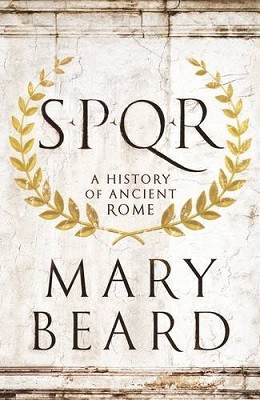In the last few weeks my attempts to read books -- and even watch television or movies -- has been worse than pathetic. There hasn't been enough time. So many domestic emergencies, medical and dental appointments. Then the traveling, presenting, planning and organizing this that and the other, followed by doubling down to catch up with all the tasks not accomplished while doing these other things. These other things are also associated, however, let me haste to add, with spending quality time with wonderful people face to face in the real world, so there's little to complain of, really.
Last week I managed to conclude reading Mary Beard's SPQR. Once I comprehended that she had a method for writing such a book about the history of Ancient Rome, it began too be a bit irritating in its repetition. How it goes: she lays out how their own past, events and figures were believed to be or to mean by the Romans themselves, the changes on these views testified to by the variants for various political reasons -- and then, Beard herself weighs in and informs us how all them are incorrect. The matter itself always remains interesting but the method and structure wasn't.
This last weekend I began to read two new books. One of these is a history: The Love of Strangers: What Six Muslim Students Learned In Jane Austen's London (2016), by Nile Green. Among the interesting and important matters Green brings up that Austen doesn't bother covering in her fiction is the evangelical* English version of what in the U.S. was called the The Great Awakening. Austen and her family, so Church of England, like their cohorts, did not approve. There are many other matters that the author delves into which he states Austen does more to conceal than to reveal, which makes citing Austen as an historical authority of her times a more iffy proposition than Janeites like to think.
The second book I began is a Science Fiction novel, Ann Leckie's third book in her Ancillary series, Ancillary Mercy. About a third way through Mercy, I'm finding it a faster read than the previous two novels, as well as -- oddly, considering the threats -- more light-hearted, and even comic in places. This reader approves of these innovations, though they might not be noticeable unless the reader had already read the previous two.
Looking forward to future reading out of the TBR pile: West of Eden: An American Place by Jean Stein (2016); The Life and the Adventures of a Haunted Convict, Austin Reed -- the recently discovered memoir of African American life and incarceration in the nineteenth century.
------------------------
* Fiction Austen wrote -- not even realistic fiction -- neither did she write history or\ even journalism, so she gets all the slack. A novelist gets to write what she wishes to write about. However, these English evangelicals are the ranks from which came the majority of British citizens mobilized against the African slave trade, which is one of the many reasons they mattered so much in their times and eras and the press -- and they were successful in their mission. They also were activists to end slavery, but that took much longer. They were considered by so many as declasse as well, from the social strata that mattered not to those obsessed with His Majesty's Navy and the Church of England livings in gift and promotion.
Subscribe to:
Post Comments (Atom)




No comments:
Post a Comment